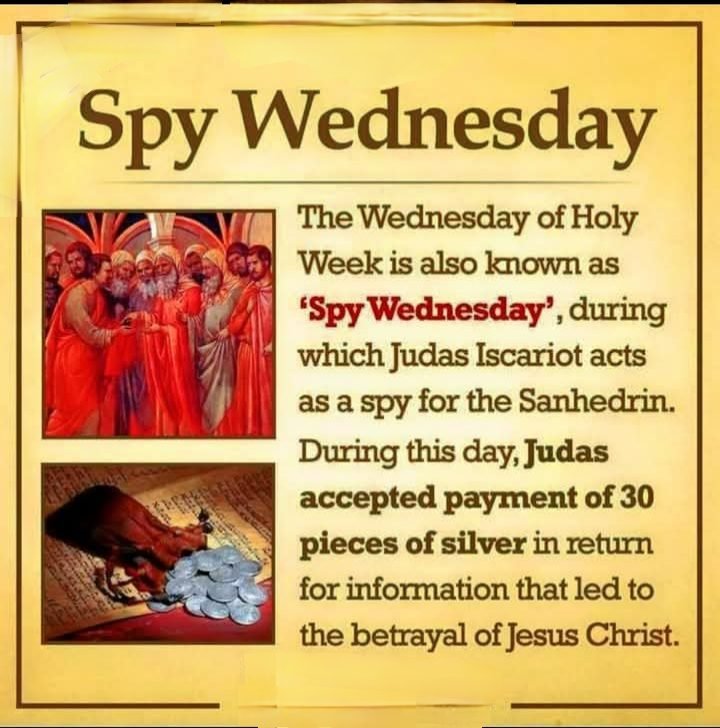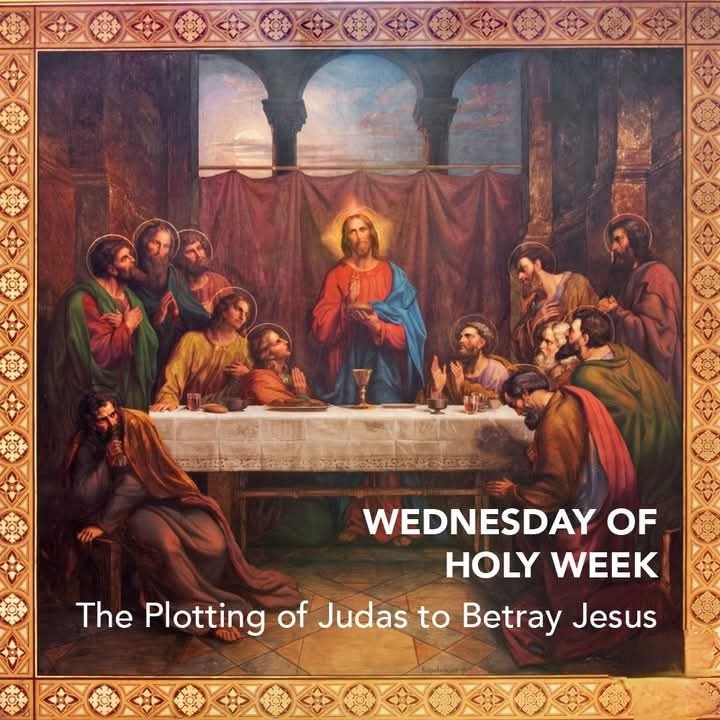HOLY WEDNESDAY OF HOLY WEEK (SPY WEDNESDAY)

OBSERVING HOLY WEDNESDAY
Holy Wednesday is observed on varying dates each year. In 2025, it falls on April 16 in the United States. For Christians, Holy Week begins with Palm Sunday and concludes with Holy Saturday—the day before Easter Sunday, which celebrates the resurrection of Jesus Christ.
During Holy Week, Christians reflect deeply on their faith, remembering the suffering, death, and resurrection of Jesus. In Greek and Roman texts, this week is referred to as the “Great Week” due to the significant acts of God that are believed to have occurred during this time.
HISTORY OF HOLY WEDNESDAY
Holy Week marks the final week of Lent, a season that begins with Ash Wednesday. Lent is a time of reflection and repentance, commemorating the 40 days Jesus spent fasting in the desert.
Throughout this sacred week, Christians focus on the Passion of Christ—his suffering and death on Good Friday for the salvation of humanity. The mood of the week is generally solemn, encouraging contemplation of Jesus’ sacrifices.
The week begins on Palm Sunday and ends on Holy Saturday, comprising seven days leading to Easter Sunday. Across denominations, Christians participate in various ceremonies and traditions to honor Jesus’ journey, culminating in Easter celebrations of his resurrection.
The term “Holy Week” dates back to the fourth century and was used by early church leaders like St. Athanasius of Alexandria and St. Epiphanius of Constantia. Initially, only Maundy Thursday, Good Friday, and Holy Saturday were considered holy. Over time, each day of Holy Week became associated with specific events in Jesus’ life.
Holy Wednesday is also known as Spy Wednesday, as it marks the day Judas Iscariot agreed to betray Jesus for 30 pieces of silver. As recorded in Matthew 26:14–16, Judas approached the chief priests, asking, “What are you willing to give me if I deliver him to you?” From that moment, he sought the right time to betray Jesus—acting in secret, like a spy.

WAYS TO OBSERVE HOLY WEDNESDAY
- Attend Church Services
While not everyone can visit Jerusalem, where Jesus lived and ministered, believers are encouraged to attend church services to pray, reflect, and participate in special observances. - Practice Fasting
Many choose to fast or avoid indulgent foods, such as meat, to embrace a spirit of solemnity and sacrifice—mirroring Jesus’ own self-denial. - Read the Bible
Reflecting on Scripture helps believers connect more deeply with the events of Holy Week, reminding them of the significance and emotional depth of Jesus’ final days.
5 LITTLE-KNOWN FACTS ABOUT HOLY WEDNESDAY
- A Day of Anointing
In Greece, the sacrament of Holy Unction (anointing of the sick) is often administered on this day. - Multiple Names Across Cultures
In the Czech Republic, it’s sometimes called “Ugly Wednesday” or “Soot-Sweeping Wednesday.” - Known as a Day of Shadows
In Malta, Holy Wednesday is referred to as “Wednesday of Shadows,” symbolizing darkness and betrayal. - Jesus Was Anointed
On this day, Mary of Bethany anointed Jesus with oil in an act of devotion and recognition of his divinity. - Unique Traditions by Denomination
Anglican churches may hold a Tenebrae service, featuring readings and extinguishing candles to represent the encroaching darkness before Jesus’ death.

WHY HOLY WEDNESDAY MATTERS
A. Deep Historical Roots
Christians have commemorated this week for over 2,000 years, remembering the pivotal events in Jesus’ life that are central to their faith.
B. Cultural and Spiritual Learning
Even for non-Christians, learning about Holy Wednesday offers insight into a profound spiritual tradition and promotes greater understanding across faiths.
C. Annual Renewal of Faith
Holy Week allows Christians to reconnect with their beliefs, remembering the ultimate expression of love and sacrifice through Jesus’ life and death.

GOSPEL FOR WEDNESDAY OF HOLY WEEK
One of the Twelve, who was called Judas Iscariot, went to the chief priests and said, “What are you willing to give me if I hand him over to you?” They paid him thirty pieces of silver, and from that time on he looked for an opportunity to hand him over.
On the first day of the Feast of Unleavened Bread,
the disciples approached Jesus and said,
“Where do you want us to prepare
for you to eat the Passover?”
He said,
“Go into the city to a certain man and tell him,
‘The teacher says, “My appointed time draws near;
in your house I shall celebrate the Passover with my disciples.””‘
The disciples then did as Jesus had ordered,
and prepared the Passover.
When it was evening,
he reclined at table with the Twelve.
And while they were eating, he said,
“Amen, I say to you, one of you will betray me.”
Deeply distressed at this,
they began to say to him one after another,
“Surely it is not I, Lord?”
He said in reply,
“He who has dipped his hand into the dish with me
is the one who will betray me.
The Son of Man indeed goes, as it is written of him,
but woe to that man by whom the Son of Man is betrayed.
It would be better for that man if he had never been born.”
Then Judas, his betrayer, said in reply,
“Surely it is not I, Rabbi?”
He answered, “You have said so.”-Matthew 26:14–25

The desire for money can become a powerful incentive to betray our Lord. In this Gospel passage, it seems clear that Judas’ betrayal was based on his desire for money. He most likely had some level of faith in our Lord, or he wouldn’t have become His disciple. But even if Judas did have some level of faith, his desire for money appeared to overshadow the faith he may have had.
One of the central lessons we can learn from Judas is that the desire for money is a powerful incentive for the decisions we make. So many of the great saints have taught us that the path to holiness consists, first, in a purification of all our disordered affections. And since one of the most powerful attachments that many struggle with is an attachment to money, this is an important desire to purify in all of our lives.
It’s true that material possessions are not evil when they are used for the fulfillment of God’s will. But the desire for more, for an excess, will always cloud our ability to see clearly the will of God and live for His glory alone.
Once Judas had betrayed our Lord and Jesus was arrested, recall that Judas “deeply regretted what he had done.” And during Jesus’ trial, Judas went back to the chief priests and said “I have sinned in betraying innocent blood” in an apparent attempt to stop the trial. But Jesus’ death was set in motion and could not be stopped. As a result, Judas returned the money and sadly went off to hang himself (See Matthew 27:3–5).
The desire Judas had for money clouded his thinking. And his sin did to him what sin always does. As soon as his sin of betrayal was done, Judas saw the consequences of that choice. And the consequences grieved him deeply. He learned that choosing sin ends with an empty promise. He realized that thirty pieces of silver was not worth the value of his soul. But of course, even then Judas could have repented and received the mercy of God. But he didn’t. He simply ended his life in ultimate despair.
Reflect, today, upon the witness of Judas. Use him as a source of meditation and self-examination this Holy Week. What is it in your life that you desire more than our Lord? What temptation clouds your thinking and leads you to choices that you know will end in emptiness? Strive to eradicate every disordered desire within you this day and choose wisely the will of God instead. Do not let yourself continue to believe the lies that keep you from making Jesus and His holy will the one and only focus of your life.
LET US PRAY
My divine Lord, You and You alone must become the focus of my life. You and You alone are of the greatest value in life. Help me to shed all earthly desires in life so that I will not fall into the temptations that lead to empty promises and so that I will embrace the true and fulfilling promises that come from You. Jesus, I trust in You. Amen







